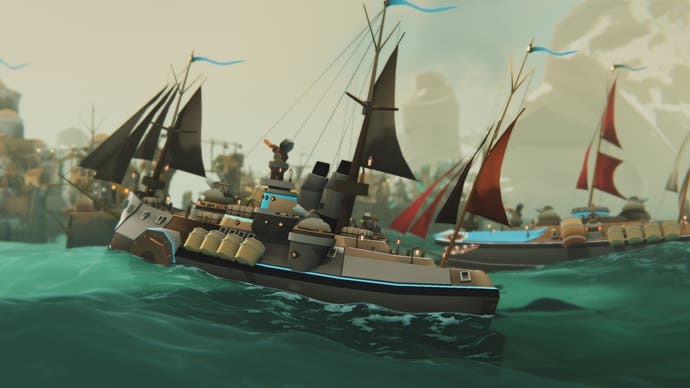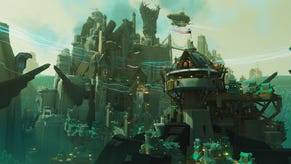Bulwark: Falconeer Chronicles - further excavations from one of the deepest imaginations in games
Slope downwards to thy depths.
I have a memory of talking to Tomas Sala over Zoom or whatnot. He's in a room in his house cluttered with children's toys - I think his family had just welcomed a new baby - and he was talking about his game The Falconeer with such quiet passion, talking about an idea so good he could barely seem to control it. I have a memory of all that, and of thinking - oh, this guy is special.
And then The Falconeer came out and it was special, an aerial combat game with lovely controls, but also - and more importantly for me, I think - an astonishing sense of place. Its oceans and sparse outcroppings of land where tentative, often warlike civilisations were forming like coral? This didn't feel so much like something Sala was making up. It felt like something he had found and was showing to us. It had this astonishing fictional integrity, which was all the more powerful for the gaps that the game left for the player to fill in.
When I heard Sala's next game, Bulwark, was set in the same universe and was a sort of city-builder - emphasis on "sort of" - I knew it was going to be special, too. Special and odd and defying easy category, which, let's face it, is one of the best things you can say about a game. I pictured something a bit like Townscaper, and so I was wonderfully befuddled when I loaded up the game's evolving demo on Steam and - what? A tutorial? A campaign? What is this exactly?
God, I think it might be brilliant. I think it is brilliant. And it's odd and slightly grumpy in places. It's wilful and distinct and it feels like nothing else. And it is sort of a city builder! But one that plays by the rules established by The Falconeer. So let's get at what that means.
Civilisation in The Falconeer is something that clings. What there is of the land exists as these spiky, upthrusting fingers and palms of rock emerging from stormy water. This is landscape without much in the way of flat surfaces, and it calls for a limpet mentality. The civilisations in The Falconeer cleave to the rock and then build upwards - gantries and walkways, all rickety, mismatched, connected to towers, and moving off in tacking lines, from one anchor point to the next.
So it is with Bulwark. You start with a tower, you connect it to resource nodes, and then you upgrade. So far, so city builder. But this is Tomas Sala, right? Making the game in his own house, I suspect, and fathoms deep in his own imagined world. So you start with an airship, which is your surveyor, and you ghost it through stormy skies, looking for a spar of rock to build your first tower on. And then you head off, as far as you dare, to find a source of wood, and then a source of stone, and you build rickety hand-made factories on these nodes, and then you switch to a sort of ground mode and connect them to your central towers. How? By drawing lines and building walkways, pulling them up out of the sea, teetering them over rocks, edging them closer and closer to the point where everything fits together.
Here's the thing: this is not actually arduous. It's actually rather pleasant to do, and there's a lovely contrast between planning things out with bright, sharp, raster lines of pure light, and then committing, and seeing all that wood and corrugated plating come together. But crucially, when you take the landscape into account, the art design, the crashing, roaring audio, and the animations that build these unlikely paths and conduits with desperate speed, well, it feels arduous. And this is good! It should feel arduous. Because fiction is form here, and the fiction is all about inhospitable spaces where you need to be a limpet or a herring gull to really fit in. I play Bulwark for fifteen minutes and I'm properly exhausted - but I also feel triumphant.

It continues, of course. Resources. Upgrades. Outreach. The steady desire to rule more of the patently unrulable ocean. But it always comes with that Tomas Sala twist, the splinter of fiction and world-building where you're not expecting it. The voiceover in the tutorial is like being hectored by a stern lighthouse keeper, someone who knows what it takes to survive against these elements and wants you to learn all that as quickly as possible so you can survive too.
And more. When you start to create harbours, to connect your central tower to distant nodes, you have to find deep water, which is a very evocative thing to be told you have to do, right, and then you have to choose a person to run the place. There's a list of rugged people to choose from, and while, yes, there's some tactical stuff involved because maybe each one only wants to carry certain types of cargo, there's also just something wild and romantic and brilliant about having to make that kind of choice in the first place.
I'm still working my way through the evolving demo, stopping every now and then to get a break from the waves and the spray and the sheer glorious inhospitable nature of it all. And I'm still being delighted and surprised by these little elements that I couldn't have foreseen, that nobody but a creator like Tomas Sala would have thought to include. And each time I find a new one I think: of course, this would have seemed obvious to Sala. Because to him, this place is all real, and by creating it for us, he's really just excavating it from his own imagination.






